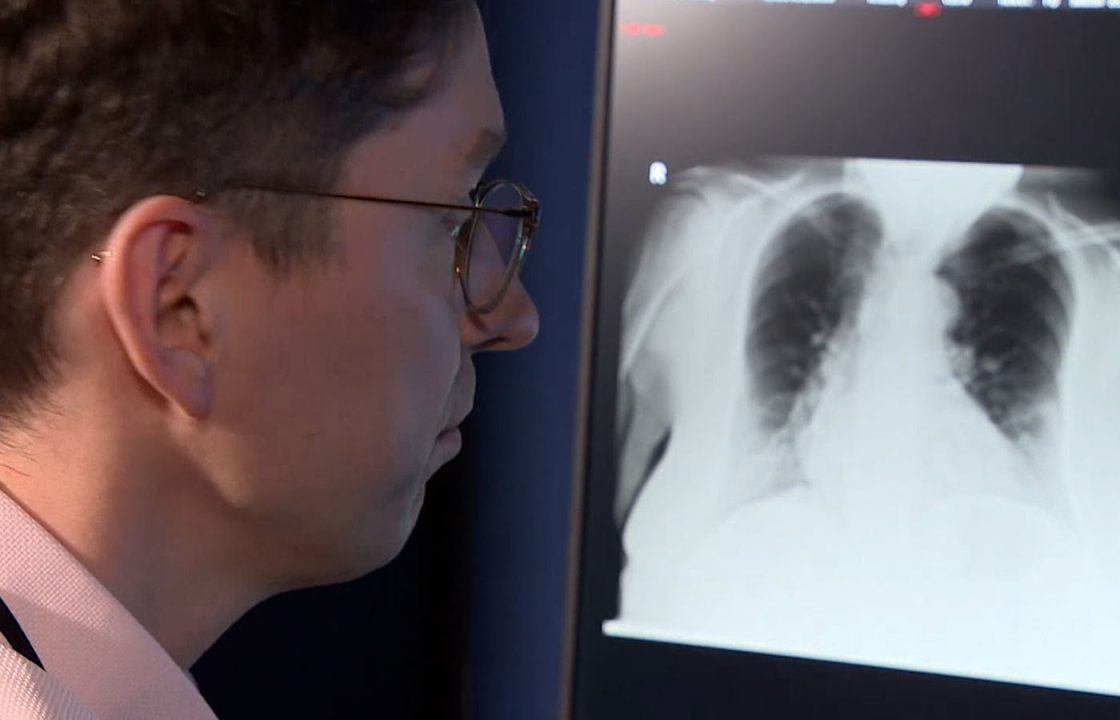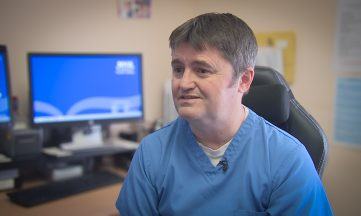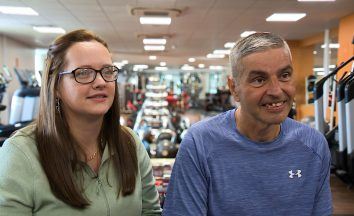Health boards in Scotland are trialling artificial intelligence technologies to carry out specific tasks.
Among them is NHS Grampian’s radiology department, which is using AI to help consultants screen for cancer.
Their tool compares x-rays to a “gold standard” abnormality-free example. Within seconds it’s able to critique whether there’s any mass in need of review – and assess it’s urgency.
Brian Morrisey, consultant radiologist at NHS Grampian, showed Scotland Tonight an example.
Holding up a patient’s radiograph, he explained that AI from a company called Annalise works in the background to help identify any abnormalities.
This particular case has been triaged as being abnormal and requiring urgent attention.
Mr Morrisey said: “The patient was referred for a chest radiograph, looking for pneumonia, but this appears more like a mass, this is likely lung cancer.
“The patient has then gone on to have an urgent CT scan the same day, which confirms likely lung cancer and puts them immediately into the lung cancer diagnostic pathway.
“It certainly speeds up the diagnostic pathway for this patient. So they can start their treatment that much earlier. And that’s the goal; to find cancers earlier.”
With thousands of radiographs to assess every week – and wait times for cancer treatments at their highest ever level in Scotland – there’s hope the new technology will ease workloads and quickly help flag patients who are most in need of care, giving them the best chance of survival.
Hugh Bishop, divisional clinical director at NHS Grampian’s radiology department, said: “This is a really exciting potential development.
“There’s around 130 or more different potential abnormalities that are programmed in for the AI to recognise. What would have been potentially a number of weeks of work has been curtailed to a few days, which gets the front end of the cancer pathway really accelerated.
“For patients who might be anxious about their care decisions being taken over by a computer, I think it’s really important to emphasise that all of this is driven by the clinicians that are already here caring for you.
“Ultimately, we don’t want anyone to wait for longer. But at the moment, that is not the reality that patients are living through. So if we can find ways to use AI to prioritise the correct patients for urgent care, then that helps everybody. It helps the whole population of patients.”
AI set to alter future of many industries
The advancement of AI technology has thrust the spotlight on the future of numerous industries.
Jobs previously viewed as “safe” now have question marks hanging over them. We’re already seeing greater automation of customer service and retail workers and that could expand in some way to drivers, accountants, lawyers and journalists.
Steph Wright, head of the Scottish AI Alliance, said: “With each technological advancement, there’s always been a concern for the jobs of the day – you know, jobs that existed 100 years ago, don’t exist now.
“Technologies such as AI, which are transformative, have the potential to transform the way we live our lives, the way we work, the way we learn.
“I think anyone will be disingenuous, if they say that, ‘Oh, of course, your job is not at risk’. But, you know, I think the jobs will change, there will be new jobs that we don’t even know will exist yet.
“But there are certain jobs that require ultimate human empathy, like the human touch, that, as of yet, cannot be replaced by technologies such as AI. There will be new jobs, new sectors, new areas where thousands of jobs will be created.”
For now, the AI being used is known as “narrow AI”, meaning it’s created and trained to perform a specific function. In the not too distant future experts would like to create “Artificial General Intelligence” and then “Artificial Super-Intelligence”.
Such technology would be able to function on a par with a human, or even better. Some think it’s years off; others think it’s closer to reality than we’d like to believe.
Whatever the answer – many are of the agreement that now is the time to regulate the technology so we can harness AI’s transformative capabilities before falling foul of science fiction clichés.
Possibilities and problems
As a concept, AI has been around for a number of decades. Many of us have used it without even realising – think tailored advertisements on Facebook, voice assistants on your phone, Siri, or Amazon Alexa.
But the release of ChatGPT has put AI in the hands of the consumer for the first time. Within months, the chatbot unveiled AIs incredible capabilities and sparked new conversations on the possibilities and problems it could bring.
Advanced robots designed to make domestic and social life that bit easier will likely be available to buy in the future.
Dr Thusha Rajendran from the National Robotarium said: “One of them might be the Pepper Robot who we can deploy into care homes, that might be able to help tell people when they might want to take medication – they’d help also with facilitating interaction. We have robots that are looking after people’s spaces and bedrooms.
‘If you look at countries like Japan you’ll see robots are for example in banking and in shopping malls and I think you’ll see that be a reality in Scotland in the not so distant future.
”A lot of what we have in front of us has already been dictated by the past. This is a blank canvas, you can make of it what you will really, so I think there’s almost nothing but opportunity.”
Tom Wilkinson, the Scottish Government’s chief data officer, said: ‘I don’t think there’s any question that it has the power to change lives or people’s people’s day to day in all kinds of ways.
“And I think if we look at it, it already has a lot of services we take for granted, you know if it’s route finding on maps, or just the way our search engines work nowadays, there’s a lot of AI probably going on behind the scenes that we we really don’t see anymore.
“It’s only going to grow, I think the amount of impact it has. And we can hope that it will move at a comfortable pace like that going forwards as well.”
For now, tech experts are excited about AI’s possibilities but they also acknowledge that challenges remain over privacy, data, disinformation and bias.
Wilkinson added: “Obviously, there are fears around how AI can be misused, or how it could accidentally lead to wrong decisions if it’s been poorly established, poorly designed.
“And that’s why efforts like the Scottish Government’s AI register, which I think is really groundbreaking in terms of public transparency around the use of AI will make sure that it’s it’s very visible to the population, where these technologies are being used and how their data might be being used.
“Even if it’s to give them all of the benefits of this technology.”
Follow STV News on WhatsApp
Scan the QR code on your mobile device for all the latest news from around the country
























